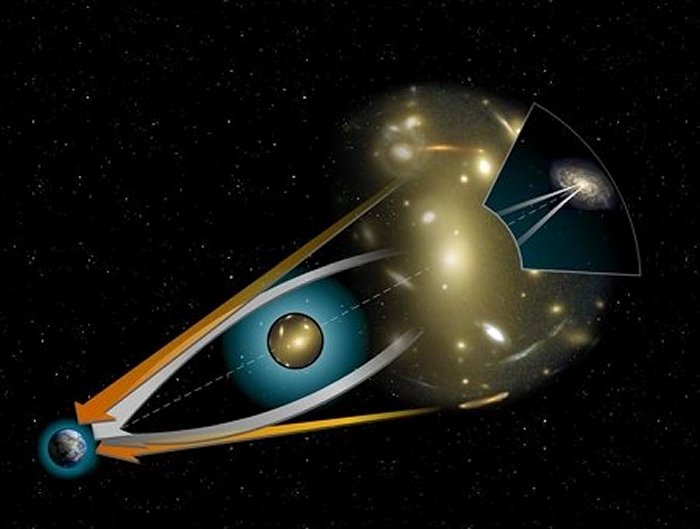When Will Humans Join The ‘Galactic Club’?
MessageToEagle.com – Most people believe that humans will sooner or later establish open contact with aliens.
When it happens, we might get an invitation to join what scientists and science-fiction writers refer to as the “Galactic Club”.
There is also a possibity that advanced extraterrestrial civilizations will not welcome us a new members. So, naturally we might wonder what criteria will be used to determine whether we will be able to enter the Galactic Club or not.

According to David Schwartzman, a biogeochemist at Howard University in Washington D.C, there is reason not to give up on SETI. Schwartzman thinks aliens are out there, despite the fact that the search for extraterrestrial intelligence (SETI) has only found silence. He also outlines what we need to do for planet Earth to be initiated into the Galactic Club.
“Lee J. Rickard and I have put forward a scenario for eventual entrance of Earth into the Galactic Club in our paper published in 1988 (Lee J Rickard is a radio astronomer and I am a biogeochemist).
We proposed that at some future time, our terrestrial civilization might achieve sufficient maturity to proceed with a program to detect so-called leakage radiation – the electromagnetic TV, radio and other broadcast signals that are inadvertently sent out into space (military radars are the strongest, a possible universal signature of a late stage primitive civilization),” says David Schwartzman.

Could an alien probe be hiding among the asteroids,
keeping an eye on Earth? Credit: NASA/U. of Arizona
In his scientific paper, David Schwartzman writes:
“This proposed program has a critical distinction from virtually all of observational SETI: detecting a targeted beacon from ET requires that they intended to send one.
The absence of evidence it not necessarily evidence of absence, if intention is lacking.
On the other hand, for a relatively short time, primitive civilizations like us leak radio waves to space, unintended signals that we could potentially detect.
The technical requirements for a galaxy-wide search are dictated by the size of the radio telescope, with the detection range proportional to the effective diameter of the telescope.
A large enough radio telescope situated in space could potentially set meaningful upper limits on the rate of emergence of primitive Earth-like civilizations (‘N/L’ in the Drake equation), without ever actually detecting the leakage radiation of even one ET civilization.
But just how big a telescope is required for this project, and at what cost? Our 1988 paper provided such estimates: a dish diameter on the order of 500 kilometers, at a cost of roughly $10 trillion. Perhaps the cost has come down somewhat (but note the estimate was in 1988 dollars). This is surely a project with a vanishingly small chance of implementation in today’s world.
The asteroid belt is estimated to contain over 1 million asteroids with diameters exceeding one kilometer.
I could only conceive of a demilitarized newly mature planetary civilization, call it Earth-United (Finally!), with any intention of implementing such an ambitious project that has no apparent immediate practical benefits.

Then and only then would we successively detect a message from the Galactic Club (GC), presumably faint enough to be only detectable with a huge radio telescope in space.
On the other hand, the GC may be monitoring biotically-inhabited planets by remote Bracewell probes that have programmed instructions.
Such a probe would plausibly be now hiding in the asteroid belt (as Michael Papagiannis once suggested). If the GC exists, there was ample time to set up this surveillance system long ago.
Surveillance probes so situated in planetary systems would send welcoming signals to newly mature civilizations, with the potential for a real conversation with artificial intelligence constructed by the GC, if not reconstructed biological entities.
If this proposed surveillance system is absent, we should expect the GC to use highly advanced telescopes to monitor planetary systems that have prospects for the emergence of intelligent life and technical civilizations. These alien telescopes could use gravitational lenses around stars. Planetary system candidates to the GC could expect to receive continuous beacons, but the signals would be very weak or disguised so that they would only be decipherable by newly mature civilizations that just pass the entrance requirements.
The problem with this scenario is there would be a fairly long communication delay with the GC, because they would be so far away. Nevertheless, reception of a rich message from the GC is possible.
The material and/or energy resources needed for these signals to be recognized must correspond with great probability to a newly ripe mature civilization. Hence, cleverness in itself cannot be the criteria for successful detection and decipherment, otherwise a brilliant scientist on a primitive civilization might jump the GC protocol.
Our world will change completely once we enter the Galactic Club.
I submit that if we want to enter the Galactic Club, the challenge lies in reconstructing our global political economy. A few minor side benefits should result, like no more war, no more poverty, a future for all of humanity’s children with a substantial proportion of biodiversity intact. We should not expect the Galactic Club to save us from ourselves.”
MessageToEagle.com
Reference:
Schwartzman, D. and L.J. Rickard,
Being Optimistic about SETI, American Scientist, 76, No.4, 364-369.
Related Posts
-
 Newspaper Rock Art: Ancient Indian Petroglyphs That Tell 2,000-Year-Old Story Of Utah
No Comments | Aug 24, 2016
Newspaper Rock Art: Ancient Indian Petroglyphs That Tell 2,000-Year-Old Story Of Utah
No Comments | Aug 24, 2016 -
 Mysterious Brain Of Daniel Tammet – A Scientific Rosetta Stone
No Comments | Apr 7, 2014
Mysterious Brain Of Daniel Tammet – A Scientific Rosetta Stone
No Comments | Apr 7, 2014 -
 DNA Reveals How Europeans Are Related
No Comments | Oct 24, 2016
DNA Reveals How Europeans Are Related
No Comments | Oct 24, 2016 -
 Incredible Ancient Masks – Evidence Of Giants In Bolivia?
No Comments | Mar 25, 2020
Incredible Ancient Masks – Evidence Of Giants In Bolivia?
No Comments | Mar 25, 2020 -
 Visit The Most Extreme Soundless Place On Earth
No Comments | Nov 17, 2015
Visit The Most Extreme Soundless Place On Earth
No Comments | Nov 17, 2015 -
 Mysterious Gympie Pyramid: Evidence Of An Ancient Lost Civilization In Australia?
No Comments | Feb 13, 2020
Mysterious Gympie Pyramid: Evidence Of An Ancient Lost Civilization In Australia?
No Comments | Feb 13, 2020 -
 Mysterious Star Pulses May Be Alien Signals, Study Claims
No Comments | Oct 28, 2016
Mysterious Star Pulses May Be Alien Signals, Study Claims
No Comments | Oct 28, 2016 -
 Goddess Artemis – One Of The Most Respected Olympians
No Comments | Oct 1, 2016
Goddess Artemis – One Of The Most Respected Olympians
No Comments | Oct 1, 2016 -
 Heatwave: Think It’s Hot In Europe? The Human Body Is Already Close To Thermal Limits Elsewhere
No Comments | Jul 30, 2019
Heatwave: Think It’s Hot In Europe? The Human Body Is Already Close To Thermal Limits Elsewhere
No Comments | Jul 30, 2019 -
 Mysterious Monolith At Gardom’s Edge Was An Ancient Astronomical Calendar
No Comments | Aug 3, 2016
Mysterious Monolith At Gardom’s Edge Was An Ancient Astronomical Calendar
No Comments | Aug 3, 2016
